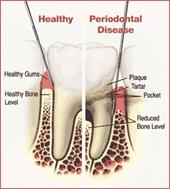Periodontitis, characterized by progressive loss of periodontal attachment and alveolar bone, is one of the most prevalent chronic diseases and a major cause for loss of permanent teeth in the US. Periodontitis affects ~35% of the US adults over the age of 30 years.
Pathogenesis of periodontitis is complex, with multiple contributing factors, such as life styles, nutrition, systemic diseases, and medications etc. Among these factors, genetic determination is most  important asevidenced by a high heritability of ~50% for periodontitis. However, specific genes underlying periodontitis are currently unknown.
important asevidenced by a high heritability of ~50% for periodontitis. However, specific genes underlying periodontitis are currently unknown.
With recent significant advances in densely spaced SNP identification, high-throughput genotyping technologies, improved knowledge of linkage disequilibrium (LD) patterns and haplotype structureacross the human genome, genome-wide association studies (GWAS) have now become a feasible and powerful strategy for genetic dissection of human common diseases.
Our general hypothesis is that risk genes for periodontitis can be detected with a powerful GWAS. To make preparation for such a GWAS, under the support of an NIH RC2 grant, we are performing a pilot study to extract and quantitate genomic DNA from buffy coat samples from periodontitis ;subjects and normal controls, which are provided by our collaborators, Dr. Robert Genco's group at University of Buffalo.
